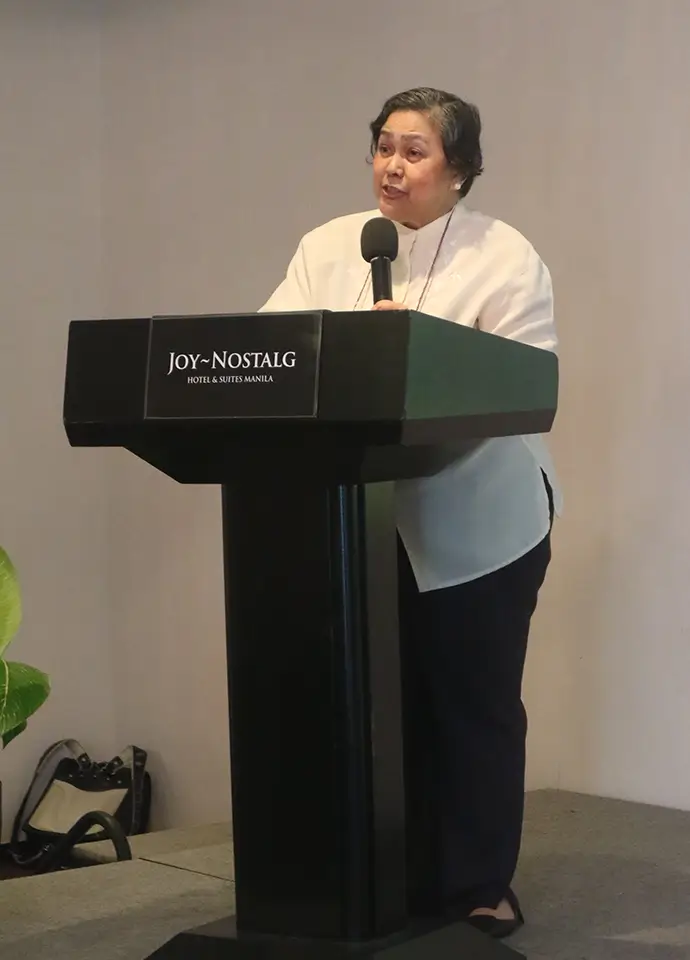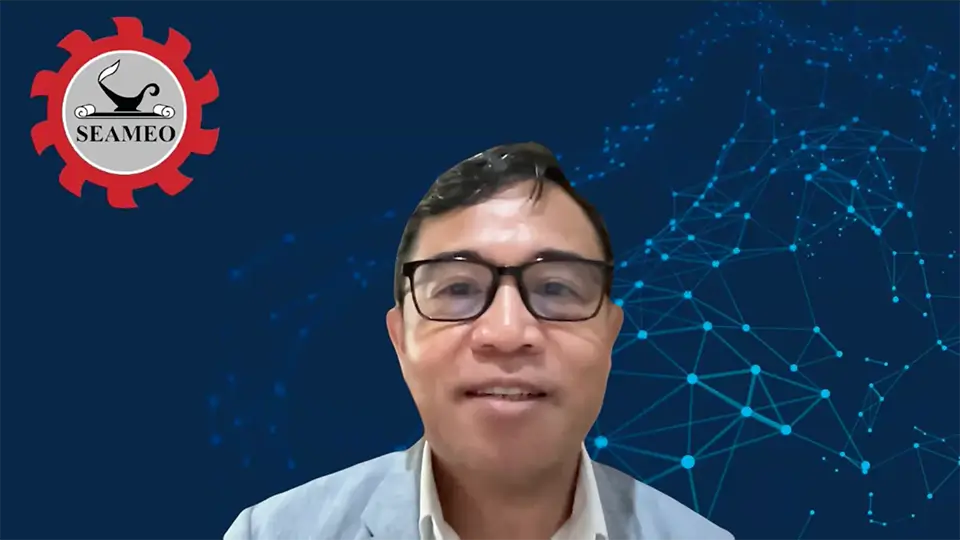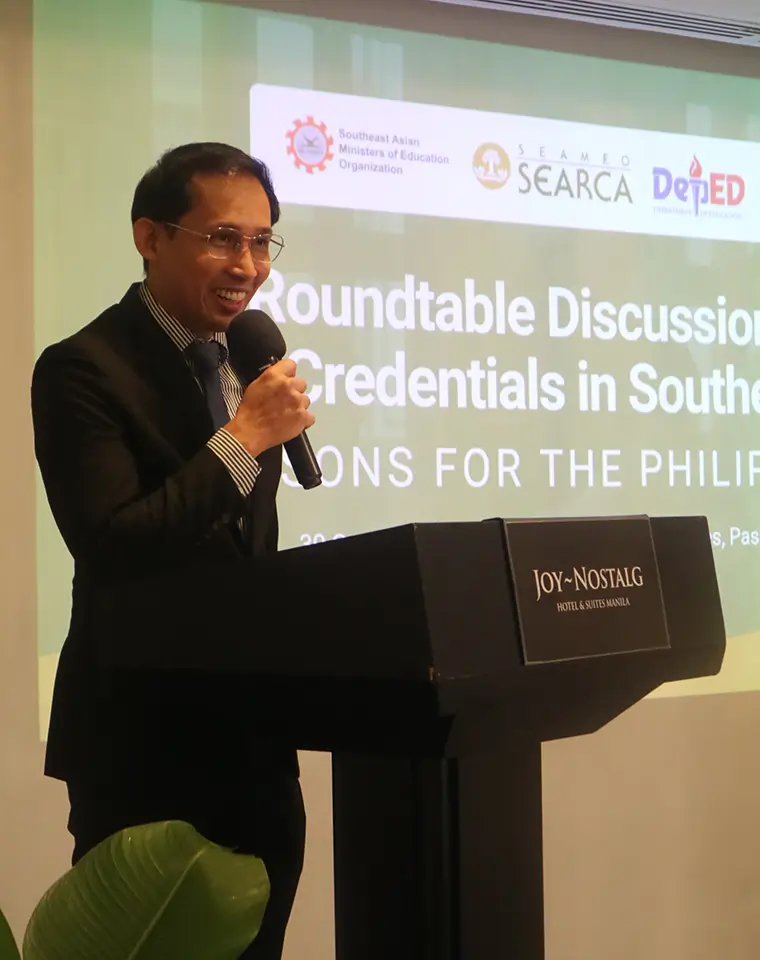PASIG CITY, Philippines—The Southeast Asian Regional Center for Graduate Study and Research in Agriculture (SEARCA) convened the Roundtable Discussion on Micro-Credentials in Southeast Asia: Lessons for the Philippines on 30 October 2025 at Joy~Nostalg Hotel & Suites, Ortigas Center, Pasig City, with hybrid participation from regional and national experts in education, government, and industry.
Organized with the support of the Philippine Department of Education (DepEd), the event forms part of SEARCA's Regional Scoping Study on Micro-Credentials in Southeast Asia, a six-month research initiative examining national policies, institutional practices, and quality assurance mechanisms in Indonesia, Malaysia, the Philippines, Singapore, and Thailand.
 In her welcome remarks, Dr. Mercedita Sombilla, SEARCA Center Director, emphasized that education in Southeast Asia is a "story of resilience, reinvention, and rising ambition."
In her welcome remarks, Dr. Mercedita Sombilla, SEARCA Center Director, emphasized that education in Southeast Asia is a "story of resilience, reinvention, and rising ambition."
She highlighted that micro-credentials are not merely a passing trend but "a strategic imperative" for building flexible, inclusive, and future-ready learning systems.
"Micro-credentials matter for the farmer's daughter who cannot afford a four-year degree but dreams of building climate-smart solutions for her community," Sombilla shared, highlighting their potential to democratize opportunities and enable lifelong learning across diverse contexts.
 Mr. John Arnold Siena, Deputy Director for Programme and Development of the Southeast Asian Ministers of Education Organization (SEAMEO) Secretariat, reaffirmed SEAMEO's regional leadership in promoting harmonization and 21st-century curriculum reform. He noted that micro-credentials "offer exciting possibilities for advancing the equity agenda," particularly for learners from underserved and crisis-affected communities, thereby contributing directly to Sustainable Development Goal 4 on Quality Education.
Mr. John Arnold Siena, Deputy Director for Programme and Development of the Southeast Asian Ministers of Education Organization (SEAMEO) Secretariat, reaffirmed SEAMEO's regional leadership in promoting harmonization and 21st-century curriculum reform. He noted that micro-credentials "offer exciting possibilities for advancing the equity agenda," particularly for learners from underserved and crisis-affected communities, thereby contributing directly to Sustainable Development Goal 4 on Quality Education.
 Representing Education Secretary Juan Edgardo "Sonny" Angara, Atty. Amorsolo Camara, Jr., Director IV for International Cooperation and Government Relations at DepEd, expressed the Department's commitment to reimagining education through flexible learning pathways. He emphasized that micro-credentials can serve as a "passport to opportunity" for Filipino learners, bridging education and employability in the 21st-century workforce.
Representing Education Secretary Juan Edgardo "Sonny" Angara, Atty. Amorsolo Camara, Jr., Director IV for International Cooperation and Government Relations at DepEd, expressed the Department's commitment to reimagining education through flexible learning pathways. He emphasized that micro-credentials can serve as a "passport to opportunity" for Filipino learners, bridging education and employability in the 21st-century workforce.
In the session on Regional Perspectives on Micro-Credentials, moderated by Dr. Nur Azura binti Adam, Deputy Director for Programs at SEARCA, panelists from across Southeast Asia presented their countries' frameworks and institutional practices. The discussion highlighted how regional and national institutions— such as Wawasan Open University in Malaysia, Kasetsart University in Thailand, the Thailand Professional Qualification Institute (TPQI), SEAMEO Regional Language Centre (RELC) in Singapore, SEAMEO Regional Open Learning Centre (SEAMOLEC) in Indonesia, and the United Nations Educational, Scientific and Cultural Organization (UNESCO) Regional Office in Bangkok—are shaping frameworks that connect education, workforce development, and digital innovation. The session highlighted that while Southeast Asian countries differ in their models, terminologies, policies, and status of implementation, all are united in advancing micro-credential systems that promote lifelong learning, portability, and quality assurance across the region.
Philippine experiences and future directions in micro-credentials were the focus of the afternoon session, moderated by Assoc. Prof. Joselito Florendo, SEARCA Deputy Director for Administration.
The session on Government Perspectives on Micro-Credentials featured representatives from DepEd, Commission on Higher Education (CHED), Technical Education and Skills Development Authority (TESDA), and Professional Regulation Commission (PRC). They shared how their respective agencies are operationalizing flexible learning and credentialing pathways across the education and skills ecosystem.
DepEd highlighted the integration of micro-certification in the Alternative Learning System (ALS) under the ALS Act (RA 11510) to validate learners' life skills and enhance employability. CHED presented updates on the implementation of CMO No. 1, s. 2025, which institutionalizes micro-credentials in higher education, emphasizing the need for coherence in frameworks and partnerships across disciplines and regions. TESDA discussed its TVET micro-credentialing ecosystem anchored on modular, stackable, and demand-driven qualifications that align with industry needs and support the upskilling and reskilling of Filipino workers. Meanwhile, PRC showcased its Credit Accumulation and Transfer System and the integration of micro-credentials into continuing professional development and career progression frameworks to ensure lifelong learning for licensed professionals.
Unilab Manufacturing Network provided an industry perspective on aligning micro-credential offerings with workforce needs as well as their lifelong learning initiatives through UniEd.
Collectively, these initiatives demonstrate the Philippines' multi-agency effort to establish an inclusive national approach to micro-credentials—bridging education, employment, and professional advancement.
The session on Academic Perspectives, moderated by Prof. Dr. Benjamina Paula Flor from the College of Development Communication, University of the Philippines Los Baños (UPLB), heard from representatives of Philippine universities who showcased diverse institutional approaches to flexible, lifelong learning.
UPLB emphasized the role of higher education institutions in aligning micro-credentialing with national development priorities, highlighting the integration of short courses within existing graduate and continuing education frameworks. UP Open University shared its micro-credentialing framework anchored on lifelong learning, detailing its evolution from MOOCs to formal academic integration, credit transfer mechanisms, and industry-aligned, quality-assured microcourses that enable learners to stack credentials. Mapúa University presented its industry-responsive credentialing ecosystem, which offers globally recognized programs in collaboration with certification partners. Batangas State University discussed its industry co-created model where all courses are co-developed and co-assessed with partners, ensuring alignment with real-world technical competencies and employability needs.
Taken together, these experiences reflect how Philippine higher education institutions are advancing flexible learning systems that bridge academic excellence, industry relevance, and lifelong learning.
In her synthesis, Dr. Maria Cristeta Cuaresma, SEARCA Senior Program Head for Education and Collective Learning, noted that discussions throughout the day converged on three critical needs: policy coherence and alignment among education sectors and agencies; industry participation in curriculum co-design and skills validation; and regional collaboration for credit portability and mutual recognition of micro-credentials. She emphasized that micro-credentials must not only respond to market demands but also uphold inclusivity and lifelong learning as core principles of regional education transformation.
The roundtable concluded with Dr. Nur Azura binti Adam reiterating SEARCA's commitment to sustaining the dialogue and strengthening partnerships toward a coherent Southeast Asian framework for micro-credentials.
The roundtable discussion marked another milestone in SEARCA's efforts to advance its mandate under the SEAMEO Priority Areas and its 12th Five-Year Development Plan: Sustainable Transformation of Agricultural Systems through Innovation in Southeast Asia (SUSTAIN Southeast Asia). The discussion contributes to SEARCA's goal of empowering stakeholders through flexible and innovative learning pathways that promote lifelong learning and regional collaboration.
